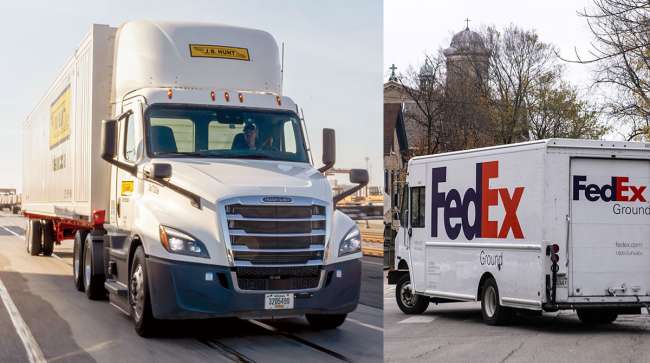Staff Reporter
Leading Freight Companies Prepare for Trucking Turnaround

[Stay on top of transportation news: Get TTNews in your inbox.]
Two of the largest for-hire carriers in the United States are making operational and financial preparations for an anticipated upturn in the freight market after months of weak demand, executives said at a recent industry event.
“This, for us, has been the toughest freight recession — and longest — in terms of depth and duration in my 30-year career,” J.B. Hunt Transport Services President Shelley Simpson said Nov. 12 from the 54th annual Baird Global Industrial Conference. “But I think we’ve done a good job managing through that part of the process. We’re looking forward to turning the chapter and hopefully moving into a better position coming into 2025.”
Simpson said the company focused on three key priorities during the downturn: providing customers with value to help create opportunities when conditions improve; scaling investments to promote growth across its various business segments; and driving long-term compounding returns back to shareholders.

Simpson
“Our first priority is really to reinvest back into the business for long-term returns,” Simpson said. “Anytime that we could put more capital to use from an equipment perspective on behalf of our customers, that’s going to be over a longer-term basis. And then, certainly, we’re going to be thinking about opportunistic buying from a stock perspective and then return back dividends to our shareholders.”
The overall economy has taken a toll on some of the top producers at FedEx Corp., said Chief Financial Officer John Dietrich. “I think if you reflect on the numbers, we were impacted by reductions in our highest yielding products,” he said. “But you have to keep in mind the market macro environment we’re in. I think it’s pretty well-known the macro environment has been pretty challenging. Industrial production is down.”
Through October, the manufacturing sector contracted 23 times over the prior 24 months, according to the Manufacturing ISM Report on Business. Dietrich anticipates that industrial production will be a major contributor to an eventual increase in freight volume growth, in addition to other factors such as expected growth in e-commerce.

Dietrich
“We’ll be well positioned for that,” Dietrich said. “E-commerce is going to make up a large percentage — probably up to 90% — of the volume growth that our ground network and our freight business will be the beneficiary of. So, we can’t ignore that volume is going to be there. We just have to find the right cost structure to accommodate it.”
Until then, FedEx is following a disciplined approach focused on revenue quality and managing capacity, he said. Central to that has been shifting more heavy freight to truckload where the excess capacity has been high. Dietrich also noted that the pricing environment has remained rational.
“You’re seeing volumes are softer [and] the weight per shipment is down slightly, roughly 3%,” Dietrich said. “But we’re seeing a 5% improvement per hundredweight. You have a strong pricing environment and we’ll be very capable of adapting to the return of volumes.”
Simpson stressed that a key contributor to the freight recession was the unsettled market compelled by the coronavirus pandemic. The surge in freight demand driven by pandemic-era lockdowns eventually left the trucking industry with an oversupply of capacity when the market transitioned back to more normalized operations.
“We’ve not been good at predicting the entire COVID up or down,” she said. “I would tell you it’s gone on much longer than we anticipated. However, I think there are some positive things that we’ve seen.”
Want more news? Listen to today's daily briefing above or go here for more info
Simpson pointed to dedicated contract services as one area that has been positive, noting that the segment continues to have a very strong pipeline and sales productivity overall.
“We’ve invested in long-term opportunities for us and our people, our technology and capacity,” Simpson said. “That’s going to be really important for us as we lean into 2025 and think about the capacity that we’ve added. If you think about it from an intermodal perspective, we still have plenty of equipment to really source for our customers, and help them as they grow.”
J.B. Hunt ranks No. 3 on the Transport Topics Top 100 list of the largest for-hire carriers in North America. It ranks No. 1 in the intermodal/drayage sector list and No. 2 on the truckload/dedicated sector list. It also ranks No. 3 on the TT Top 100 logistics companies list.
FedEx Corp. ranks No. 2 on the TT Top 100 for-hire carriers list and holds the same spot on the TT Top 50 global carriers list.




